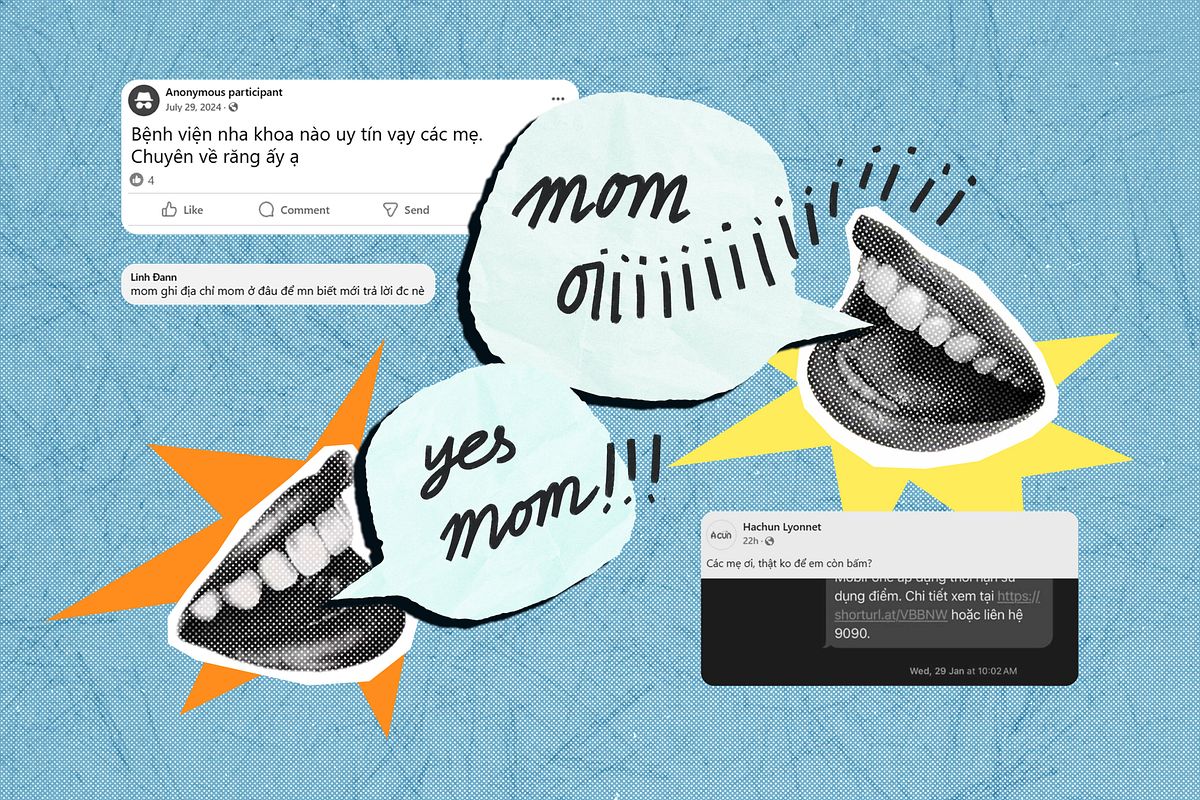I am a mom. Well, not in the most conventional meaning of the word — I am childless, and it’s still biologically impossible for men to give birth the last time I checked, but for most of my existence on the Vietnamese cybersphere, I have been using the designation “mẹ” amongst my closest friends.
A handful of my most enduring friendships have spanned decades, dating back to middle school and college. Now in the tender first half of our 30s, we’re scattered across the globe, leading different lives and careers, and group chats are amongst the few connections that still unite us every time there are gossips or crucial life updates. And for the longest time, our messenger conversations have been peppered with the pronoun mẹ, meaning “mom,” even though none of us has produced any children.
For many Vietnamese millennials, the usage of mẹ as an exclusively virtual pronounce arose during the heydays of internet forums — especially those of one forum in particular, Web Trẻ Thơ. Before the advent of social media, webtretho.com emerged as the leading platform for family and childcare discussion, amassing high volumes of female internet users. Users would affectionately refer to one another as các mẹ, mẹ bỉm, mẹ bầu, or by the formula “mẹ” plus “account name.”
When Facebook arrived in the country in the early 2010s and slowly took over forums as the de facto socialization platform for local internet users, the colorful range of mẹ-related monikers bled into Facebook comments and pages. Web Trẻ Thơ, of course, found its way to Facebook too, but its uniquely maternal lexicon was no longer confined to forum boundaries. The rest of Vietnam’s cybersphere started adopting them too, first as a nod of ironic humor, but over time, the usage has become a tongue-in-cheek inside joke, harkening back to the yesterdays of millennial innocence.
Which brings us to today, the mid-2020s, when the local cybersphere welcomed yet another social media newcomer, Threads, Meta’s supposed answer to the enshittification of Twitter/X. Vietnamese Gen Z-ers quickly embraced the microblogging app with the same enthusiasm us millennials showered on Facebook. Numerous slangs have come out of Threads, but one in particular amused me to no end: mom. We have come full circle.
My hypothesis is that the word also came from childcare content on TikTok or Facebook groups, but how the transition from mẹ to mom happened and how it arrived in Threads still elude me. Vietnamese Threads users who adopted this neopronoun employ “mom” as a replacement for second-, and sometimes third-, person pronouns: mom ơi (hey mom), các mom (you guys), mom này (he/she), etc. I’ve joked with friends that you can tell if a Vietnamese internet person is a Gen Y or Gen Z by their use of mẹ or mom.
Using “mother” in an honorific is a practice that exists outside of Vietnamese internet slang, such as the teknonymy of the Korean language — women are often referred to by the name of their children, plus “eomeoni,” like Soo-hyun-eomeoni (Soo-hyun’s mother). It’s as if after bearing children, a woman’s identity dissolves into that of her offspring. The use of mẹ and mom as neopronouns in Vietnamese internet culture, on the other hand, has much more liberating implications.
For one, even though their roots are feminine, they are extrinsically gender-neutral, age-neutral, and free of hierarchy. I can be a mom, you can be a mom, everybody can be a mom just by virtue of their presence on the Vietnamese internet. As a language, Vietnamese is notoriously context-based, especially when it comes to our library of diverse pronouns that could change based on the age, gender, family side, and professional title of both the speaker and the listener. The omni-neutral “mom” emerged as the direct response to the uncertainties of Internet interactions, where one can’t always get enough information to figure out how to address the person you’re talking to. The fact that this omni-neutral new pronoun turns out to be “mom,” a traditionally gendered role, is both poetic and empowering.















